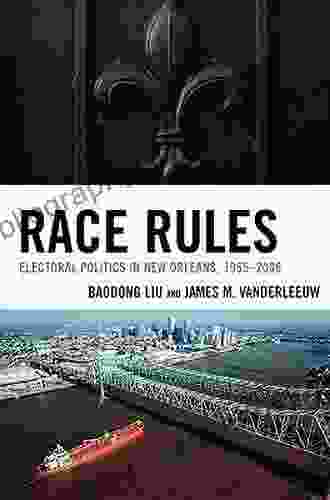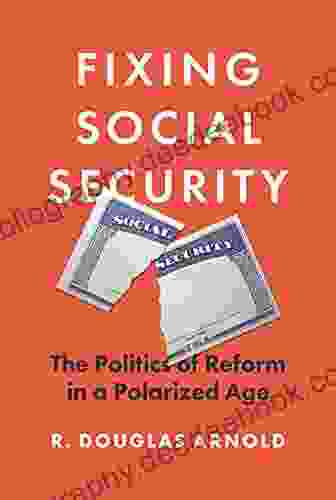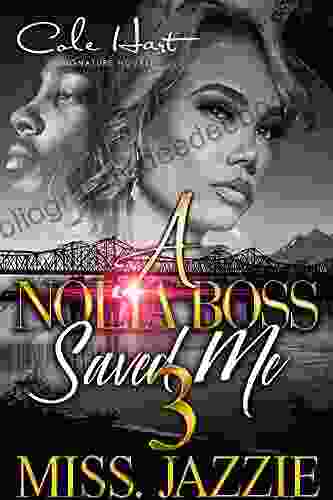Race, Rules, and Electoral Politics in New Orleans, 1965-2006

In the wake of the Voting Rights Act of 1965, New Orleans emerged as a battleground for racial politics. The city's complex electoral system, rooted in a history of white supremacy, underwent a series of contentious changes that shaped the political landscape for decades to come.
The Pre-1965 Era
Prior to the Voting Rights Act, New Orleans was governed by a system of white supremacy known as the "Old Regular" machine. The machine, controlled by a small group of white elites, maintained its power through a combination of voter suppression, gerrymandering, and patronage.
5 out of 5
| Language | : | English |
| File size | : | 6011 KB |
| Text-to-Speech | : | Enabled |
| Screen Reader | : | Supported |
| Enhanced typesetting | : | Enabled |
| Word Wise | : | Enabled |
| Print length | : | 180 pages |
African Americans, who constituted a majority of the city's population, were largely excluded from the political process. They faced barriers to voter registration, were concentrated in districts with reduced electoral power, and were denied access to patronage jobs that provided financial stability and a pathway to influence.
The Voting Rights Act and Its Impact
The Voting Rights Act of 1965 outlawed discriminatory voting practices and provided federal oversight of voter registration and elections in areas with a history of voter suppression.
In New Orleans, the Voting Rights Act triggered a dramatic increase in African American voter registration. By 1968, nearly 80% of eligible African Americans were registered to vote, up from just 20% in 1960.
The influx of new voters challenged the Old Regular machine's grip on power. In 1972, Ernest "Dutch" Morial, an African American Democrat, was elected mayor of New Orleans, becoming the city's first Black mayor.
Electoral System Reforms
The Voting Rights Act also led to a series of electoral system reforms designed to increase the political representation of African Americans.
In 1975, the Louisiana legislature adopted a new redistricting plan that created two majority-Black congressional districts and increased the number of majority-Black electoral districts for the city council and other local offices.
In 1987, the city of New Orleans implemented a system of instant runoff voting (IRV) for the mayoral election. IRV allowed voters to rank candidates on their ballots, with the winner determined by a series of elimination rounds until one candidate received a majority of votes.
Political Polarization and Racial Tensions
The changing electoral landscape in New Orleans did not occur without significant political polarization and racial tensions.
White backlash to increasing African American political power led to the rise of conservative, anti-integrationist candidates and the formation of the "Old-New Regular" machine.
Racially charged rhetoric and violence became common in political campaigns. In 1978, former Ku Klux Klan leader David Duke won a seat on the Louisiana State Legislature by appealing to white voters who felt threatened by the rise of Black political power.
The Post-Katrina Era
The devastation of Hurricane Katrina in 2005 had a profound impact on New Orleans' political landscape.
Massive population displacement, combined with the federal government's slow and ineffective response, led to widespread distrust of established political institutions.
In the aftermath of the hurricane, a new generation of political leaders emerged, many of whom rejected the divisive racial politics of the past and focused on issues of economic recovery and social justice.
Legacy and Significance
The period from 1965 to 2006 was a tumultuous time for race and electoral politics in New Orleans. The Voting Rights Act and subsequent reforms transformed the city's political system, leading to the election of the first African American mayor and increased representation of Black voters.
However, the struggle for racial equality and political power in New Orleans was far from over. Political polarization and racial tensions continued to shape the city's politics, even as new leaders sought to build a more inclusive and just society.
The legacy of the past continues to inform present-day political debates in New Orleans, as the city grapples with issues of racial disparities, economic inequality, and the future of democracy in a diverse and divided nation.
Additional Points of Interest
- The "Old Regular" machine was led by former governors Earl Long and Jimmy Davis.
- The Voting Rights Act also prohibited literacy tests and other discriminatory voting practices.
- The instant runoff voting system in New Orleans has been credited with promoting greater political diversity.
- Hurricane Katrina caused an estimated $108 billion in damage and displaced over 1 million people in New Orleans and surrounding areas.
- New Orleans' current mayor, LaToya Cantrell, is the city's second Black woman mayor.
5 out of 5
| Language | : | English |
| File size | : | 6011 KB |
| Text-to-Speech | : | Enabled |
| Screen Reader | : | Supported |
| Enhanced typesetting | : | Enabled |
| Word Wise | : | Enabled |
| Print length | : | 180 pages |
Do you want to contribute by writing guest posts on this blog?
Please contact us and send us a resume of previous articles that you have written.
 Book
Book Chapter
Chapter Story
Story Genre
Genre Paperback
Paperback Magazine
Magazine Newspaper
Newspaper Sentence
Sentence Shelf
Shelf Glossary
Glossary Bibliography
Bibliography Foreword
Foreword Synopsis
Synopsis Annotation
Annotation Codex
Codex Tome
Tome Bestseller
Bestseller Narrative
Narrative Biography
Biography Autobiography
Autobiography Memoir
Memoir Reference
Reference Encyclopedia
Encyclopedia Thesaurus
Thesaurus Resolution
Resolution Card Catalog
Card Catalog Borrowing
Borrowing Stacks
Stacks Archives
Archives Periodicals
Periodicals Research
Research Lending
Lending Journals
Journals Special Collections
Special Collections Interlibrary
Interlibrary Literacy
Literacy Dissertation
Dissertation Awards
Awards Book Club
Book Club Theory
Theory White Lemon
White Lemon Ania Malinowska
Ania Malinowska Rick Brewster
Rick Brewster Chris Ellis
Chris Ellis Christine Bailey
Christine Bailey Debra Channer
Debra Channer Thomas Benjamin
Thomas Benjamin Bruce F Katz
Bruce F Katz Miss Jazzie
Miss Jazzie Marguerite Henry
Marguerite Henry Steven Vinacour
Steven Vinacour Cara Wall
Cara Wall William I Robinson
William I Robinson Any Cherubim
Any Cherubim Hieu Minh Nguyen
Hieu Minh Nguyen Anita Diamant
Anita Diamant Lisa Rogak
Lisa Rogak Linda Apperson
Linda Apperson Bankim Chandra Pandey
Bankim Chandra Pandey Zachary David Levy
Zachary David Levy
Light bulbAdvertise smarter! Our strategic ad space ensures maximum exposure. Reserve your spot today!

 William PowellNovel Artificial Neurons and Neural Structures to Control Autonomous Robots
William PowellNovel Artificial Neurons and Neural Structures to Control Autonomous Robots Greg FosterFollow ·6.2k
Greg FosterFollow ·6.2k Ian McEwanFollow ·19.7k
Ian McEwanFollow ·19.7k James HayesFollow ·18.3k
James HayesFollow ·18.3k Hayden MitchellFollow ·5.6k
Hayden MitchellFollow ·5.6k Ralph Waldo EmersonFollow ·13.2k
Ralph Waldo EmersonFollow ·13.2k Dwayne MitchellFollow ·5.7k
Dwayne MitchellFollow ·5.7k Frank MitchellFollow ·9.8k
Frank MitchellFollow ·9.8k José SaramagoFollow ·5.8k
José SaramagoFollow ·5.8k
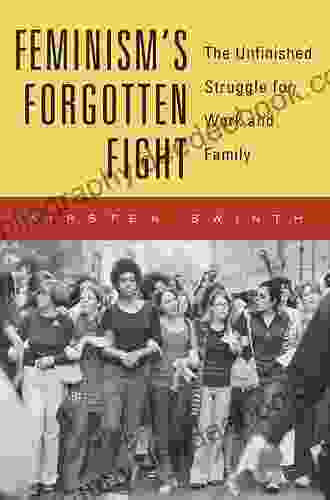
 Braden Ward
Braden WardFeminism's Forgotten Fight: The Ongoing Battle for...
The feminist movement has historically...
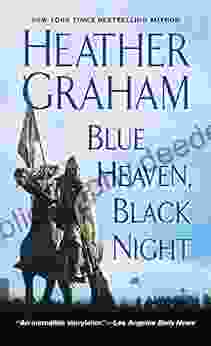
 Julio Cortázar
Julio CortázarBlue Heaven Black Night: A Literary Journey Through Love,...
In the realm of...
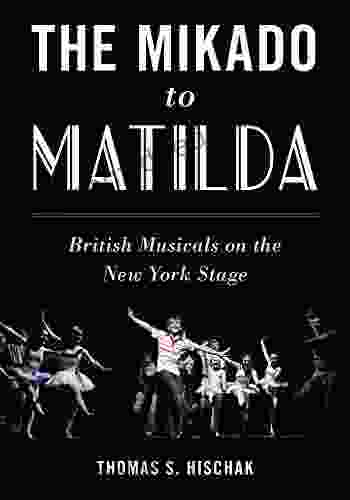
 Eddie Bell
Eddie BellA Journey Through Time: Exploring the Enchanting World of...
The vibrant tapestry of New...

 Lawrence Bell
Lawrence BellValiance Dragon Soul Press Anthology: A Literary Odyssey...
Step into a realm where...

 Aron Cox
Aron CoxEmbark on a Creative Odyssey with Jean Leinhauser's "101...
Unveil a Kaleidoscope of...
5 out of 5
| Language | : | English |
| File size | : | 6011 KB |
| Text-to-Speech | : | Enabled |
| Screen Reader | : | Supported |
| Enhanced typesetting | : | Enabled |
| Word Wise | : | Enabled |
| Print length | : | 180 pages |


